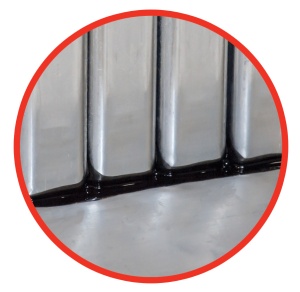By Eric Wyman, Sr. Scientist, LORD Corporation
Although electric vehicles have been a possibility for almost a century, they haven’t been terribly realistic up until this point because of myriad factors including cost, design and perception. However, with pressure to reduce vehicle carbon emissions and improve air quality, Congress recently commissioned a study by the National Academy of Sciences on hurdles to adopting plug-in electric vehicles (PEVs), as highlighted in Why Don’t We Drive More Electric Vehicles?
 Building on our expertise with thermally-conductive materials as well as structural adhesives, LORD has sought a means to help advance this industry and find a better solution. Applying the same expertise and experimenting with the chemistries used for materials used in the aerospace, industrial, oil and gas as well as a wide range of other industries, LORD set out to find a material that serves as both a mechanical bonding solution as well as thermal interface.According to the report, the array of options can be bewildering, ranging from long-range battery options such as the Tesla Model S, short-range models like Nissan Leaf, the range-extended plug-in hybrid model Chevrolet Volt (which drives on electric power most of the time), and minimal plug-in models such as the BMW i8 (which can perform short trips on battery power alone). Despite the growing list of options, one common theme is the need to find an efficient means to reduce the cost and improve the design of the battery pack.
Building on our expertise with thermally-conductive materials as well as structural adhesives, LORD has sought a means to help advance this industry and find a better solution. Applying the same expertise and experimenting with the chemistries used for materials used in the aerospace, industrial, oil and gas as well as a wide range of other industries, LORD set out to find a material that serves as both a mechanical bonding solution as well as thermal interface.According to the report, the array of options can be bewildering, ranging from long-range battery options such as the Tesla Model S, short-range models like Nissan Leaf, the range-extended plug-in hybrid model Chevrolet Volt (which drives on electric power most of the time), and minimal plug-in models such as the BMW i8 (which can perform short trips on battery power alone). Despite the growing list of options, one common theme is the need to find an efficient means to reduce the cost and improve the design of the battery pack.
The intent was to create a material that would eliminate or reduce the current trend of large mechanical structures, while serving as a cooling medium. By simplifying the design, we can help increase the energy density of the battery pack, which also allows for novel pack design.
One such solution is the recent launch of LORD Thermoset TC-1001, a thermally conductive, 10:1 mix ratio, acrylic structural adhesive. With a broad range of applications for bonding lithium ion cells to cooling plates, this product is similar to other LORD acrylics, yet it has higher thermal conductivity with comparable properties. Different than other commercially-available thermally conductive materials that require high cure temperatures, TC-1001 cures at room temperature with good thermal conductivity.
This product is yet another evolution and builds on the success of Thermoset SC-320 — a two-component system designed to retain desirable properties associated with silicones. Specially designed for thermal conductivity for electrical/electronic encapsulating applications, it exhibits low shrinkage and stress on components as it cures, and maintains a low viscosity for ease of component encapsulation compared to other highly thermal conductive materials.
Environmentally resistant and UL-rated to UL94V0 and 180C RTI, Thermoset SC-320 is composed of an addition-curing polydimethyl siloxane polymer that will not depolymerize when heated in confined spaces. Possible applications for SC-320 include those in which higher power at lighter weight is needed, such as motors for electric vehicles; aerospace actuators and motors; and portable power generation equipment.
As the trend towards battery-powered transportation continues, a question we ask ourselves as many others are jumping on the bandwagon is, “What is next?” Can we assume Tesla has the “car for the masses” or is a “secret” start up somewhere or are one of the big high-tech companies such as Google or Apple about to change the landscape further by launching something unimaginable?
